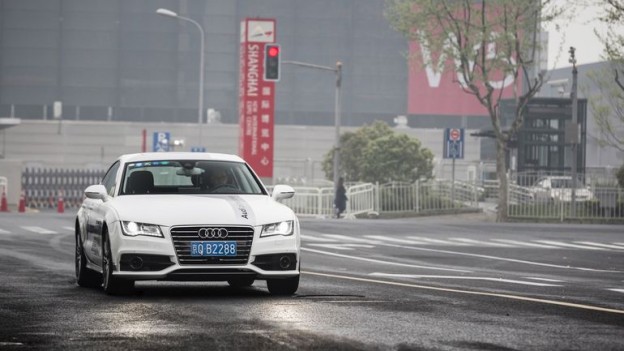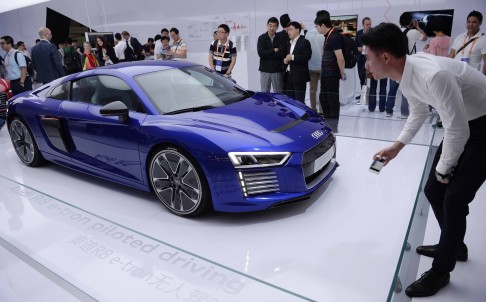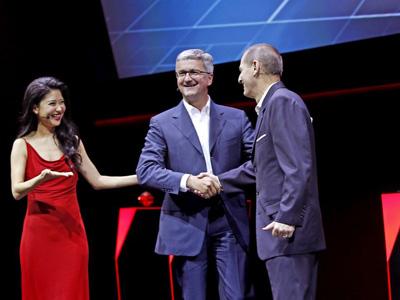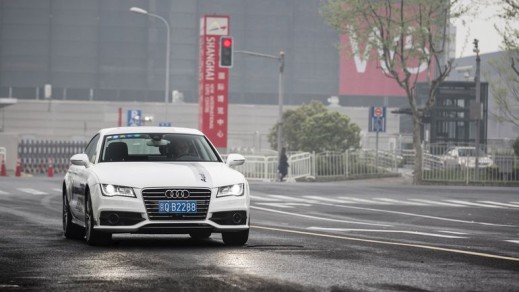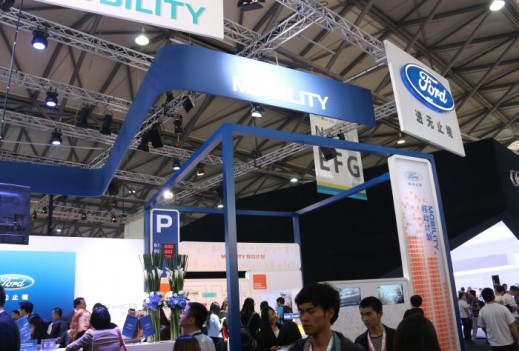Summary: Human Capital Partner (HCP) Asia MD and founder Vanessa Moriel attended the Consumer Electronics Show (CES) Asia from May 25-27, 2015. The first ever CES show held outside of the U.S. enabled automotive companies to showcase their latest electric, self-driving, connected, and infotainment technology.
Article: Human Capital Partner (HCP) Asia MD and founder Vanessa Moriel attended the Consumer Electronics Show (CES) Asia from May 25-27, 2015. The first ever CES show held outside of the U.S. enabled automotive companies to showcase their latest electric, self-driving, connected, and infotainment technology.
Attracting more than 200 exhibitors and 20,000 participants, CES Asia occupied two halls of the Shanghai New International Expo Center, with automotive brands taking over most of the N2 Hall. The first ever CES show held outside the U.S., CES Asia’s foray into Asia coincides with rapid growth in the Chinese technology consumer goods market, which is expected to grow by 5 percent this year.
Infotainment, connectivity and self-driving car technology had been at the forefront of automotive companies’ push at CES Las Vegas in January. CES Asia was no different, as carmakers seem to have identified these high-tech features as key differentiators to attract wealthy customers who are less price sensitive. This is now particularly relevant in China, where many car buyers are purchasing their second or third cars, meaning that the automobile is increasingly becoming a lifestyle accessory.
Smart cars, themselves, are seen as a key element in the concept of the Internet of Things, which was a key buzzword in Shanghai, as it had been in Las Vegas. It is well understood by forward looking automotive executives that IT technology has the potential to revolutionize the automotive industry, transforming both the production and the product of the automobile.
Correctly defining the autonomous drive and connectivity strategy has come to be seen as a determinant of future success or failure for car executives, one that will have consequences more than a decade down the line.
Of the major OEMs with a presence at CES Asia, Audi had the largest and most impressive presence. Audi debuted an autonomous version of the R8 e-tron all-electric car sportscar. The non-autonomous model had been unveiled at the Geneva Motor Show. Audi Chairman Rupert Stadler was also the pre-show keynote address.
Stadler shared his conviction that the digital revolution is having a greater impact on global business and human lifestyle than the industrial revolution. He pointed to the ways in which digital workflows, 3D printing, robotics and virtual reality are transforming the design, manufacturing, and retailing of automobiles.
According to Stadler, the self-driving car has the potential to make roads much safer, minimizing the vast amount of car deaths caused by human error. Stadler finished by introducing the new self-driving R8 eTron all-electric coupe.
Technologically comparable to the Tesla Models S, the R8 all-electric sportscar combines an impressive battery range of 450 km with a 459-hp dual motor powertrain that has enough power to take the car from 0 to 100 kmh in 3.9 seconds. The high-tech sports car is equipped with a laser scanner, video cameras a radar device and ultrasonic sensors that allow it to make its way through the busy road of China largest city, Shanghai. The self-driving model unveiled in Shanghai is a technical proof of concept, according to Audi. The all-electric R8 is expected to go on sale in 2017.
Audi also took advantage of CES Asia to announce that it is partnering with Chinese internet search giant Baidu to provide mapping, positioning and location data for its passengers. China has, in recent years, become Audi’s largest market.
Other global OEMs also had an important presence at CES Asia. Ford announced at CES Asia that it would launch its GoDrive car-sharing mobility experiment to users in London. Ford’s stand in Shanghai displayed Ford Smart Mobility experiments, its SYNC 3 in-car connectivity solution as well as the Ford Focus and the Ford GT supercar, both of which were unveiled earlier this year.
Volkswagen also had a major presence at the show. It launched the Volkswagen Golf R Touch with a gesture controlled infotainment system, the Volkswagen Connected Golf with a microphone controlled infotainment system, as well as showcasing its Volkswagen Trained Parking self-parking technology.
Automotive companies took a larger proportion of total space at CES Asia than at CES Las Vegas. Announcements made at both shows are part of a trend of growing ties between OEMs and consumer tech companies, with some consumer tech companies even planning a full entry into the car manufacturing business.
CES Asia also highlighted that major western tech companies, such as Google and Apple, are not the only ones vying to compete with global automotive OEMs. Chinese internet giant Baidu showcased the work of its artificial intelligence lab, the Institute of Deep Learning at Baidu, where it works with carmakers on China adapted self-driving technology, amongst other things.
Baidu, which is working with BMW to develop a self-driving car for China’s congested roads, has quickly grown its presence in the automotive space. At CES, Mercedes-Benz announced that it would equip its cars in China with software from Baidu, letting users hook up their smartphones to the car’s dashboard, allowing users to retrieve entertainment options such as music and the internet front their cars. No date was announced for the launch of this service.
Automakers are clearly looking to extend their entertainment offers, while advancing their compatibility with smartphones and other devices. Western companies looking to extend these offerings in China require local partners to navigate local internet habits and regulation. This has been an ongoing area of cooperation between global/Chinese OEMs and local internet giants such as LeTv, Baidu, and Alibaba.
It is clear, however, that Chinese internet companies, OEMs and policymakers are not satisfied with simply being a partner to western OEMs. As a matter of fact, Chinese officials and carmakers are welcoming the development of the smart car as an opportunity for Chinese carmakers to compete with their global counterparts who have, up to now, had the upper hand in the world’s largest car market. We can, therefore, expect Chinese automotive/technology players to try their hand at innovation in the connectivity, smart car and Internet of Things sector going forward.
Editors Notes:
Human Capital Partners is a retained executive search consultancy & talent management consultancy that specializes in the global automotive sector. We place high quality candidates in CEO and top management positions through succession planning, market scanning and pipeline management to ensure a smooth transition for both our clients and candidates. Our passion for the automotive industry and our unique approach ensures that we fully understand your business. This results in any potential risks being mitigated or carefully managed which ultimately means successful placements and satisfied clients.
PR Contact: Vanessa Moriel, Managing Director Asia (Contact Vanessa)
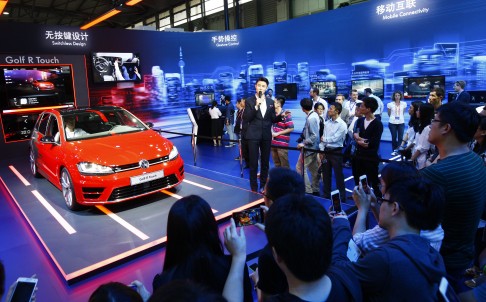
A speaker presents the Golf R Touch at CES Asia. Gesture control will allow the driver and passengers to control the car’s climate settings, volume, and sunroof, as well as other options, without having to touch any buttons or screens. The technology was initially commercialised in video games. Automakers now want to take advantage of the feature to reduce distracted driving. Volkswagen hopes to be the first automotive brand to market with gesture control. It will be competing with BMW who has previewed similar controls for the iDrive infotainment system on the forthcoming 7-series.
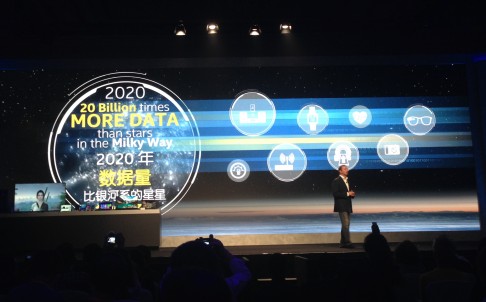
Kirk Skaugen, General Manager, Client Group, Intel, spoke about the evolution of the Internet of Things, driven by ever expanding computer processing and wireless changing devices. Kirk He outlined his vision of a world where “everything that consumes electricity computes and communicates,” at a pre-show event with CES Asia.
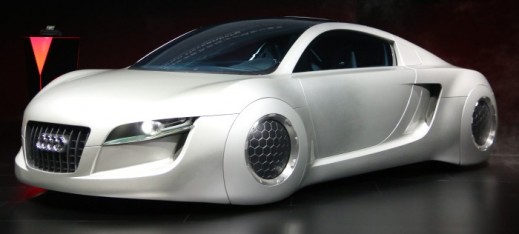
Audi’s RSQ Concept car shown at CES Asia had actually been designed for science fiction movie “I, Robot” featuring Will Smith. Many of the new technologies shown by Audi at the show were first conceived in the RSQ.
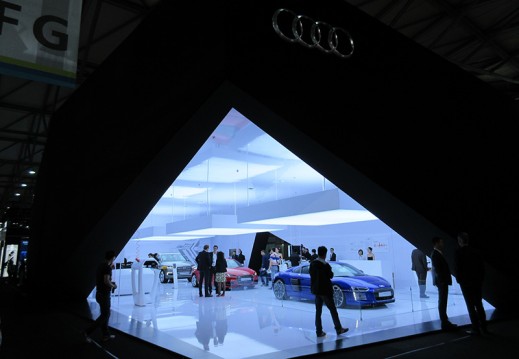
Audi had a major presence at CES Asia. Its showroom space created a unique brand experience for attendees.
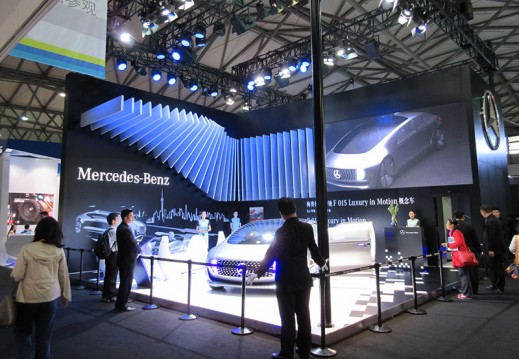
Mercedes featured its F015 concept car at the show. The stunning self-driving concept vehicle had been unveiled at CES Las Vegas in January.
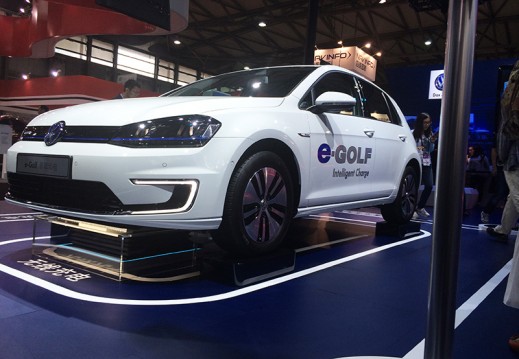
Volkswagen featured its e-golf zero emission all-electric vehicle, which also served to highlight a variety of new technologies being developed by Volkswagen.
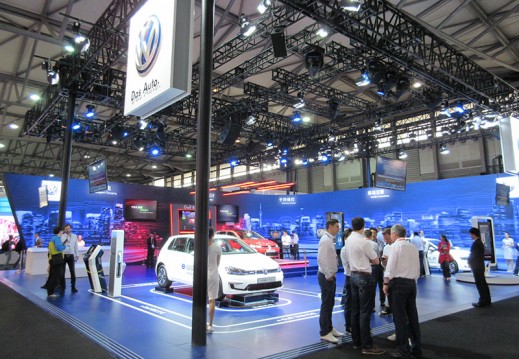
The Volkswagen booth featured an electric car charging demo that showed off its smart charging technology.


